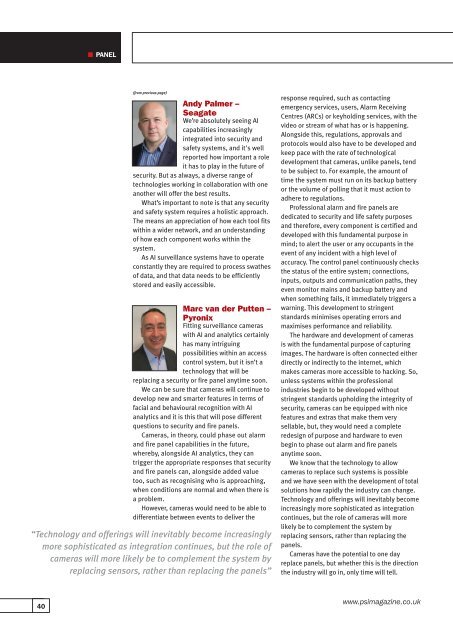PSIMay2018
Create successful ePaper yourself
Turn your PDF publications into a flip-book with our unique Google optimized e-Paper software.
PANEL<br />
(from previous page)<br />
Andy Palmer –<br />
Seagate<br />
We’re absolutely seeing AI<br />
capabilities increasingly<br />
integrated into security and<br />
safety systems, and it's well<br />
reported how important a role<br />
it has to play in the future of<br />
security. But as always, a diverse range of<br />
technologies working in collaboration with one<br />
another will offer the best results.<br />
What’s important to note is that any security<br />
and safety system requires a holistic approach.<br />
The means an appreciation of how each tool fits<br />
within a wider network, and an understanding<br />
of how each component works within the<br />
system.<br />
As AI surveillance systems have to operate<br />
constantly they are required to process swathes<br />
of data, and that data needs to be efficiently<br />
stored and easily accessible.<br />
Marc van der Putten –<br />
Pyronix<br />
Fitting surveillance cameras<br />
with AI and analytics certainly<br />
has many intriguing<br />
possibilities within an access<br />
control system, but it isn’t a<br />
technology that will be<br />
replacing a security or fire panel anytime soon.<br />
We can be sure that cameras will continue to<br />
develop new and smarter features in terms of<br />
facial and behavioural recognition with AI<br />
analytics and it is this that will pose different<br />
questions to security and fire panels.<br />
Cameras, in theory, could phase out alarm<br />
and fire panel capabilities in the future,<br />
whereby, alongside AI analytics, they can<br />
trigger the appropriate responses that security<br />
and fire panels can, alongside added value<br />
too, such as recognising who is approaching,<br />
when conditions are normal and when there is<br />
a problem.<br />
However, cameras would need to be able to<br />
differentiate between events to deliver the<br />
“Technology and offerings will inevitably become increasingly<br />
more sophisticated as integration continues, but the role of<br />
cameras will more likely be to complement the system by<br />
replacing sensors, rather than replacing the panels”<br />
response required, such as contacting<br />
emergency services, users, Alarm Receiving<br />
Centres (ARCs) or keyholding services, with the<br />
video or stream of what has or is happening.<br />
Alongside this, regulations, approvals and<br />
protocols would also have to be developed and<br />
keep pace with the rate of technological<br />
development that cameras, unlike panels, tend<br />
to be subject to. For example, the amount of<br />
time the system must run on its backup battery<br />
or the volume of polling that it must action to<br />
adhere to regulations.<br />
Professional alarm and fire panels are<br />
dedicated to security and life safety purposes<br />
and therefore, every component is certified and<br />
developed with this fundamental purpose in<br />
mind; to alert the user or any occupants in the<br />
event of any incident with a high level of<br />
accuracy. The control panel continuously checks<br />
the status of the entire system; connections,<br />
inputs, outputs and communication paths, they<br />
even monitor mains and backup battery and<br />
when something fails, it immediately triggers a<br />
warning. This development to stringent<br />
standards minimises operating errors and<br />
maximises performance and reliability.<br />
The hardware and development of cameras<br />
is with the fundamental purpose of capturing<br />
images. The hardware is often connected either<br />
directly or indirectly to the internet, which<br />
makes cameras more accessible to hacking. So,<br />
unless systems within the professional<br />
industries begin to be developed without<br />
stringent standards upholding the integrity of<br />
security, cameras can be equipped with nice<br />
features and extras that make them very<br />
sellable, but, they would need a complete<br />
redesign of purpose and hardware to even<br />
begin to phase out alarm and fire panels<br />
anytime soon.<br />
We know that the technology to allow<br />
cameras to replace such systems is possible<br />
and we have seen with the development of total<br />
solutions how rapidly the industry can change.<br />
Technology and offerings will inevitably become<br />
increasingly more sophisticated as integration<br />
continues, but the role of cameras will more<br />
likely be to complement the system by<br />
replacing sensors, rather than replacing the<br />
panels.<br />
Cameras have the potential to one day<br />
replace panels, but whether this is the direction<br />
the industry will go in, only time will tell.<br />
40<br />
www.psimagazine.co.uk

















